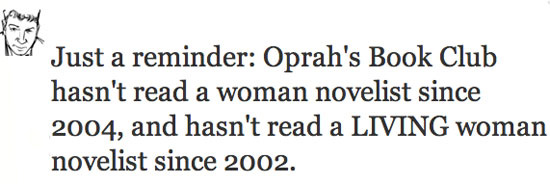Oprah Winfrey’s Book Club for Men

When the news broke that Oprah Winfrey’s book club was following up Jonathan Franzen’s Freedom with a double shot of Dickens (Great Expectations and A Tale of Two Cities), it got me to reflecting once again: Does it matter that Oprah’s Book Club hasn’t read a novel by a woman writer since Pearl Buck’s The Good Earth, and that they haven’t read a contemporary novel by a woman since Ann-Marie McDonald’s Fall on Your Knees? I got a lot of feedback when I raised this issue on Twitter; a few people took the “it’s her club and she can pick what she wants” tack, and others rightly pointed out that it’s not as if Winfrey hadn’t had any women writers on the show, but most were disappointed at the imbalance. As Washington Post book critic Ron Charles pointed out, it’s hard to imagine putting together a lineup of the most significant contemporary fiction writers that isn’t predominantly female.
So I had another look yesterday afternoon at a book I’d read earlier this year, Bring on the Books for Everybody: How Literary Culture Became Popular Culture, to focus my thoughts on the Book Club issue. (Full disclosure: Jim Collins was my college mentor.) I’m particularly interested in the way, as Collins puts it, “Oprah functions as an authority on reading for an imagined community of self-cultivators that numbers in the hundreds of thousands and who come to her expertise within the heart of consumer culture.” With so many books to choose from, how does a reader who aspires to be “literary,” or at least “well-read,” decide where to start? That’s where Winfrey comes in—and the particular genius of the Book Club’s 21st-century incarnation is that it combines the original (pre-Corrections) emphasis on the emotionally sublime power of “great books” with an emphasis on the symbolic credibility of “Great Books.”
And that leads directly to why I feel the absence of women writers in the Book Club matters.
By juxtaposing contemporary novelists like Cormac McCarthy, David Wroblewski, and Jonathan Franzen with canonical authors like Faulkner, Tolstoy, and Dickens, I would suggest the Oprah Book Club is putting forth an argument about a literary continuum—saying, in essence, these people writing today are as vital to the tradition of the novel as those acknowledged masters. And, for the last six years, not one woman writer has been deemed worthy of placement within that continuum. Here are some women whose novels have not been selected for the Book Club:
- Lionel Shriver
- Carol Shields
- Tana French
- Kate Atkinson
- Hilary Mantel
- Jennifer Egan
- Lauren Grodstein
- Kathleen Kent

People have knocked the pre-Corrections Book Club roster for being full of “women’s books,” but if you look at the actual selections, men showed up regularly: Wally Lamb, Ernest J. Gaines, Chris Bohjalian, Andre Dubus III, among others. That balance has been sorely lacking in the modern Book Club, which in and of itself may or may not be significant, but in the larger context of a critical hostility towards popular women novelists, perhaps it’s a bit more unsettling. I’m not knocking any of the books Oprah Winfrey has delivered unto her audience since The Good Earth; individually, each has its merits. (OK, I haven’t read the Eckhart Tolle or the Sidney Poitier, so I make no promises there.) It’s what Oprah is saying about literature when she strings all those books together that worries me—especially since what she was saying about literature in the 1990s, right up until the point that Jonathan Franzen got anxious about The Corrections being added to that lineup, was arguably much more dynamic and interesting.
7 December 2010 | theory |

 Our Endless and Proper Work is my new book with Belt Publishing about starting (and sticking to) a productive writing practice.
Our Endless and Proper Work is my new book with Belt Publishing about starting (and sticking to) a productive writing practice. 
